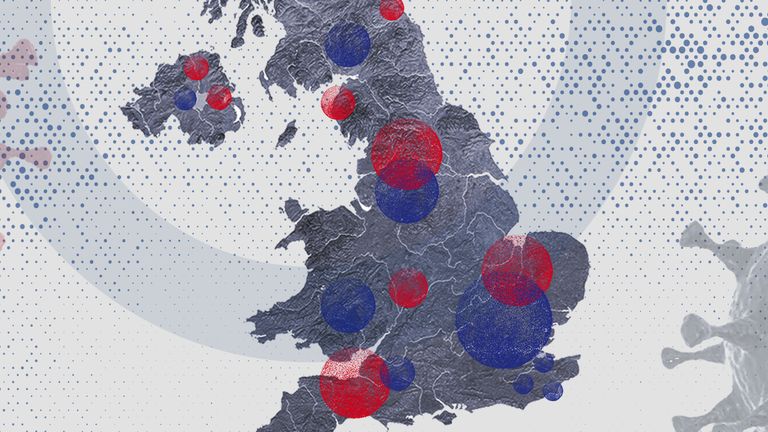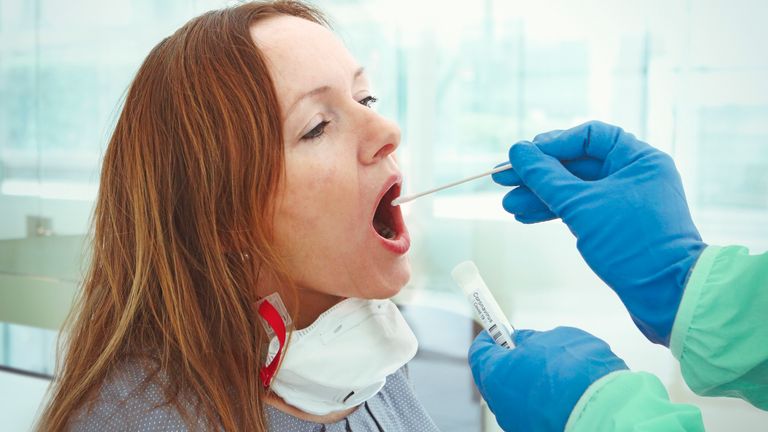Coronavirus: Ten key lessons the government must learn set out in new report
The UK has 10 key lessons to learn from its handling of the coronavirus pandemic so far, a cross-party group of MPs have warned.
While the government has been praised for seeking a diverse range of scientific opinion on how to respond to COVID-19, the Science and Technology Committee has raised concerns about some of the decisions made early on in the outbreak – as well as its preparedness for the future.
In a 19-page document, committee chairman Greg Clark acknowledged that some judgements were made “within a fog of uncertainty”, but said past experiences must be used to inform the country’s coronavirus strategy going forward.
The committee’s 10 recommendations are:
1. Greater transparency is needed about scientific advice
Mr Clark’s committee found that the transparency around scientific advice offered to the public “has not always been as clear as it should have been”.
The report says there should be greater levels of disclosure about who attends the Scientific Advisory Group for Emergencies (SAGE), which has been advising the government on the action it should take.
Concerns are also raised that just 28 of the papers used to inform SAGE meetings have been made public, out of a total of 120.
“Without visibility of the scientific advice, it will be difficult to corroborate the government’s assertion that it always follows the scientific advice,” the committee wrote.
It went on to urge the government to regularly update the list of SAGE members, promptly publish new papers after every meeting, and offer a summary of the scientific advice that has informed the government’s decisions.
2. Answers about the UK’s approach to testing are needed
The committee concluded that the UK’s testing capacity “has been inadequate for most of the pandemic so far” – and that it hasn’t been increased “early enough or boldly enough”.
Very low numbers of people were being tested well into March, the report says, with a broad range of experts from around the world telling the committee this capacity has been inadequate.
The committee heard evidence from Public Health England (PHE) on 25 March that the UK had chosen to follow a different approach to countries such as South Korea, which had engaged in mass testing early on in the pandemic.
Professor Sharon Peacock, who works for PHE, said she would offer evidence that explained why the UK rejected South Korea’s methods, but the committee claims this information was never provided.
The committee said: “The failure of PHE to publish the evidence on which its testing policy was based is unacceptable for a decision that may have had such significant consequences.
“The absence of disclosure may indicate that – notwithstanding the oral evidence given to the committee – no rigorous assessment was in fact made by PHE of other countries’ approach to testing.
“That would be of profound concern since the necessity to consider the approaches taken by others with experience of pandemics is obvious.”
3. England, Scotland, Wales and Northern Ireland must continue to work closely together
According to the report, the provision of scientific advice has been “well co-ordinated” between all four nations of the UK.
The committee heard evidence that the four chief medical officers from each nation had worked together closely – with Scotland’s interim chief medical officer Dr Gregor Smith saying “there was value to consistent messaging for ensuring public understanding and compliance”.
According to the report, this close collaboration should continue, but Dr Smith warned it is possible that divergent measures may be needed if COVID-19 spreads more severely in some areas than others.
4. Testing capacity must increase
Elsewhere in the report, the Science and Technology Committee warns “it is not clear that lessons of the delays to testing have been learned”.
“The retreat to testing only hospital patients for the virus drastically curtailed the ability to gather data that could have identified the spread of the virus among different groups and with different symptomatic severity,” the MPs wrote.
The committee recommended that the government should “take every opportunity to build capacity in advance of need to surge capacity explosively rather than follow a more gradual ‘ramping up’ approach”.
5. Deaths of BAME patients must be better recorded
The report adds that there are “significant unexplained differences in the death rates in the UK of black, Asian and minority ethnic groups compared to the population as a whole”.
Although NHS England does publish a breakdown of COVID-19 deaths by ethnicity, the committee found that this information is unavailable for almost 10% of cases – and it doesn’t cover fatalities in other settings such as care homes.
“After adjusting for age […], men and women from all ethnic minority groups (except females with Chinese ethnicity) are at greater risk of dying from COVID-19 compared with those of white ethnicity,” an Office for National Statistics report found on 7 May.
“The government should consider how ethnicity data on those dying as a result of COVID-19 could be systematically recorded,” the committee said.
6. Strategies for managing asymptomatic people must be clearer
According to the Science and Technology Committee, it has seen evidence that suggests a high proportion of people with COVID-19 who could transmit it to others “are free of all symptoms”.
The report warns “the possibility of significant levels of asymptomatic transmission have a profound consequence for the management of the pandemic”, warning: “If people have no means of knowing they are infected, then they risk transmitting the infection to large numbers of people if they are not rigorously socially distanced.
“This is a particular concern for NHS workers and care workers who may be asymptomatically infected and transmitting the disease to vulnerable people with whom they are in close contact.”
As a result, the government is being urged to “explicitly set out its approach to managing the risk of asymptomatic transmission” – with the committee warning regular testing of all workers who come into contact with vulnerable groups may be needed, even if they aren’t showing symptoms.
7. Contact-tracing capacity must be urgently built up
Rigorous contact tracing has been used in several countries with low death rates from COVID-19 – such as South Korea, Singapore and Hong Kong – but the UK’s “limited capacity” to do the same was an important factor in the decision to stop full contact tracing on 12 March, the committee concluded.
MPs heard evidence that “multiple approaches” will be needed to implement contract tracing, with NHSX chief executive Matthew Gould warning that it will be “tough” to ensure that a contact-tracing app being piloted on the Isle of Wight is used by enough people to be effective.
“It is clear from the experiences of other countries, such as Singapore, that we cannot rely on the use of a contact-trading application to fulfil our needs,” the committee said.
It added that contact-tracing capabilities need to be built up quickly to ensure social-distancing measures can be eased, while minimising the risk of a second peak in infections.
8. Isolation and quarantine must be part of the government’s “test, track and trace” strategy
The Science and Technology Committee heard evidence from leading experts around the world who said quarantine and isolation had been a crucial part in testing, tracking and tracing the virus elsewhere.
When testing and tracing has reached a dependable level in the UK, the committee suggested that providing dedicated facilities for isolation and quarantine “may be worthwhile set against the more hidden but vastly greater cost of maintaining tighter restrictions on the rest of the population”.
9. Capacity for making and deploying vaccines must increase
The committee said it was “encouraging news” that the first human trials of a potential COVID-19 vaccine are now under way in the UK – describing it as “testament to the UK’s expertise in this area”.
Professor Andrew Pollard from the University of Oxford told MPs that potential vaccines need to be manufactured before their effectiveness is proven, or it could be “years and years” before the UK has a vaccine that’s ready for mass use.
“To wait until all trials are completed in order to build up the capacity to manufacture and distribute vaccines could lose valuable time,” the committee warned.
“Therefore, even at the risk of redundancy, it is imperative to ensure that the UK has built up sufficient manufacturing and distribution capacity to roll-out a vaccine as soon as its effectiveness is proven.”
10. The government should continue to draw on extensive scientific advice
The Science and Technology Committee also heard plenty of evidence praising SAGE, which has been “highly influential in government decisions throughout the pandemic”.
Sir Patrick Vallance, the government’s chief scientific adviser, had told MPs there had been little disagreement between the government and SAGE “on anything material”.
Encouraging existing practices to continue, MPs added: “It is clear that the government has been serious in taking scientific advice, and that British scientists on SAGE have sought to give that advice in a way designed to help decision making.”
Responding to the report, a Downing Street spokesman said: “This is an unprecedented global pandemic and we have taken the right steps at the right time to combat it, guided at all times by the best scientific advice.
“Our response has ensured that the NHS has been given all the support it needs to ensure everyone requiring treatment has received it, as well as providing protection to businesses and reassurance to workers.
“Testing is a key part of our response and we have expanded testing capacity on an unprecedented scale – from 2,000 tests a day in February to more than 100,000 in May.
“Now everyone aged five and over who has symptoms and needs a test can get one – and we will continue to build this capacity.”
Source: Read Full Article









